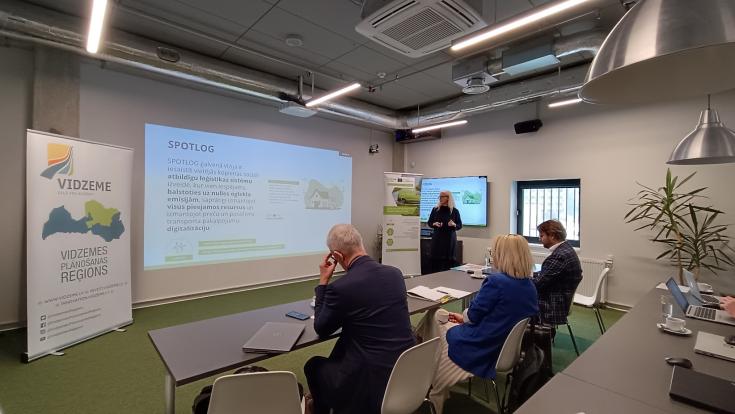Decarbonizing Transport in Cēsis

Reducing transport emissions is critical to achieving Latvia’s climate goals.
At a regional stakeholder meeting held in late November in Cēsis, industry experts, entrepreneurs, and municipal representatives explored practical solutions to accelerate progress toward decarbonization. Organized as part of the SPOTLOG project, the seminar emphasized the need for interaction between policies, society, and technology to achieve sustainable change.
One key focus was the role of data in driving decarbonization efforts. The CommitClimate simulator, developed under the Interreg BSR project, provides municipalities with an invaluable tool to assess the impacts of different policy scenarios. This simulator not only highlights the potential outcomes of timely action but also clearly visualizes how delays hinder emission reduction efforts. Municipalities play a crucial role in collecting and utilizing data to accurately model and forecast developments in the transport sector, enabling more targeted and effective decarbonization strategies.
The SPOTLOG project presented innovative logistics solutions, including green logistics models, digital twins, and shared mobility services, which are already proving effective in reducing emissions and optimizing resource use. As SPOTLOG expert Zane Pīpkalēja noted, data-driven decisions resonate more effectively with policymakers, fostering meaningful change.
Participants also highlighted the urgent need for infrastructure development, financial incentives, and operational efficiency. Latvia requires robust charging infrastructure for heavy transport and significant subsidies to support both supply and demand-side transitions. A pressing question raised during the discussions was the economic balance of emissions reduction: How much does it cost to save one ton of CO2? Additionally, participants emphasized the interdependence between charging infrastructure and private-sector investment. A limited electric vehicle fleet discourages infrastructure development, while insufficient infrastructure hinders fleet expansion—a cycle that must be broken to advance progress.
In brainstorming sessions, participants identified key strategies to stimulate decarbonization in Latvia, including:
• Enhancing municipal support mechanisms, such as tax breaks and financial incentives for businesses.
• Introducing motivating frameworks for municipalities, such as increasing state budget allocations for those that achieve decarbonization targets.
• Providing subsidies for fleet renewal and infrastructure development, minimizing co-financing requirements for businesses.
• Strengthening public-private partnerships to drive long-term progress.
National-level policies often lack the specificity and clear mechanisms needed to guide decarbonization efforts effectively, creating additional challenges for regions and municipalities attempting to align with broader climate goals. The decarbonization process remains highly complex due to the absence of universally reliable data and clear future projections. Persistent myths, historical biases, and significant energy market disruptions over recent years have further fueled uncertainty, fostering hesitancy in decision-making.
Despite these challenges, platforms like this regional meeting are vital for fostering collaboration, aligning stakeholder efforts, and driving actionable solutions. Discussions will continue, focusing on integrating feedback into regional strategies, initiating targeted projects, and embedding best practices in municipal policies. These collective actions aim to build the resilience and innovation required to overcome barriers and advance toward climate neutrality.